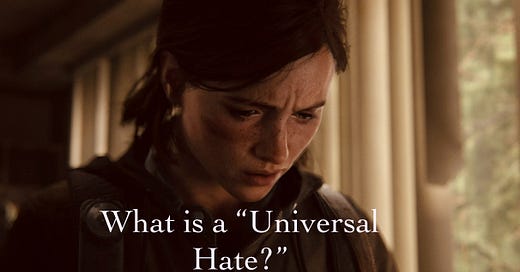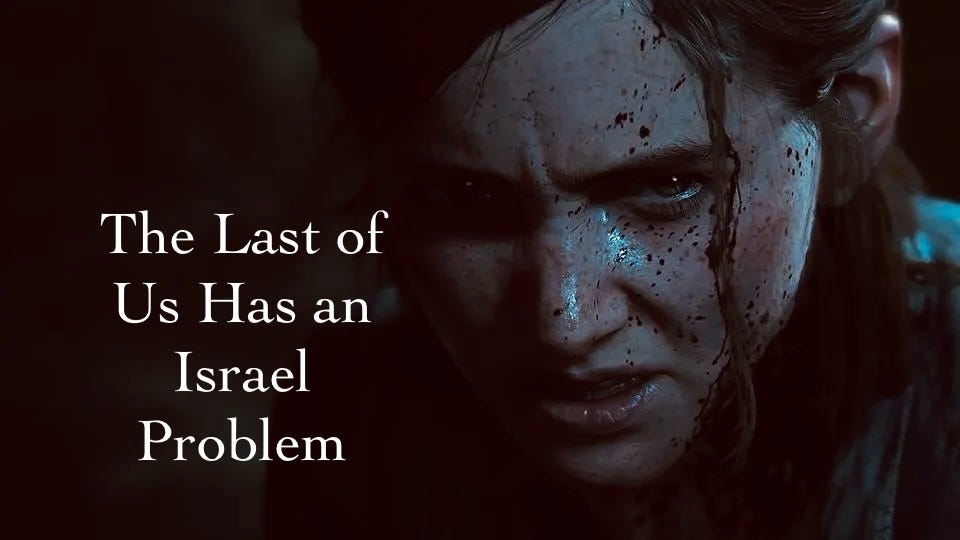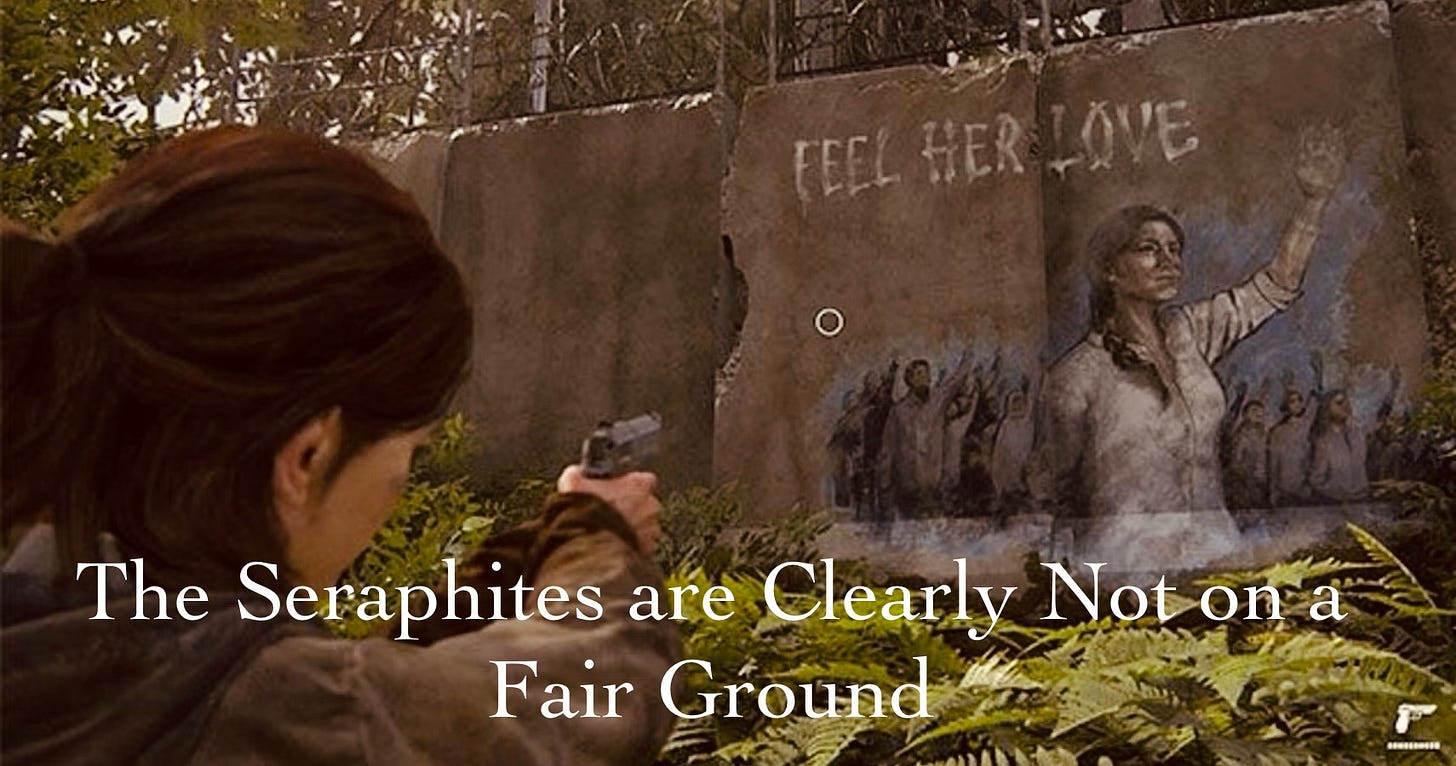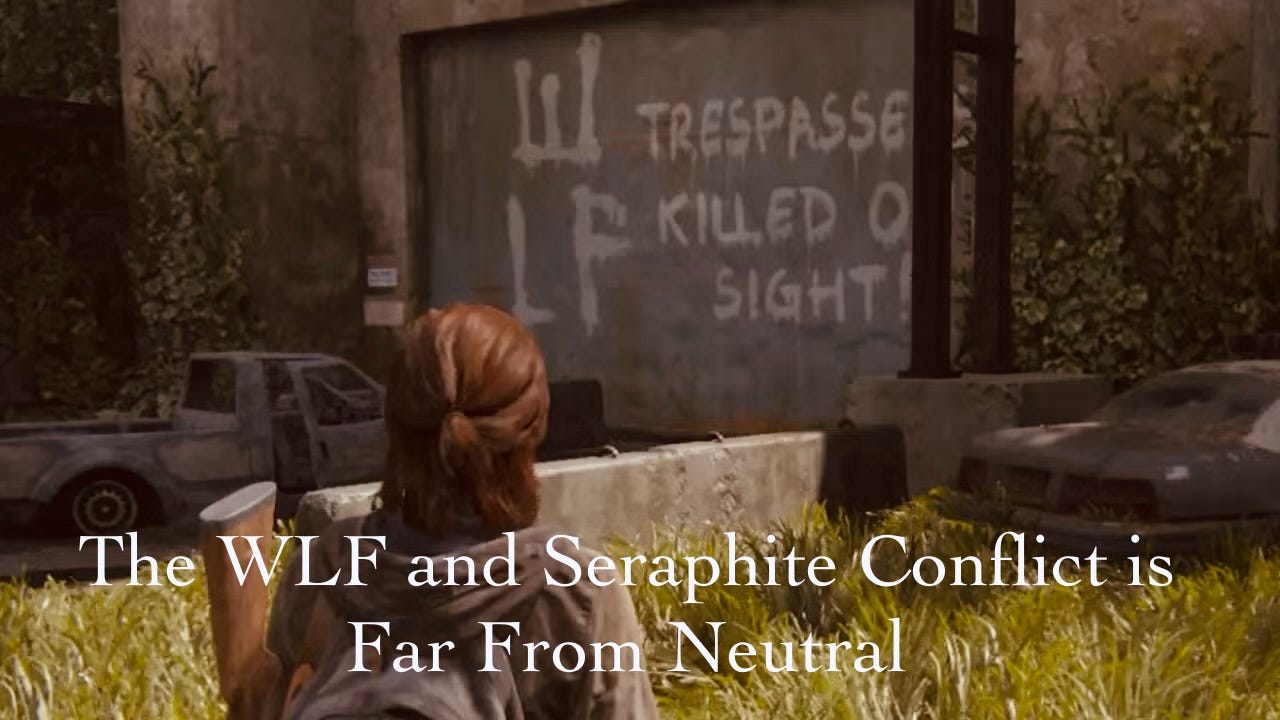"The Last of Us" Has an Israel Problem
In this piece, I discuss Neil Druckmann's background and his use of real-life conflict as inspiration for "The Last of Us"
CONTAINS HEAVY SPOILERS FOR BOTH GAMES
I have made it no secret that “The Last of Us” is one of my favourite modern stories. It certainly is one of the best games ever made, in large part due to its storytelling prowess and its ability to centre emotion in its gameplay. But I have increasingly found it difficult to reconcile the fact that it is a franchise which harbours Israeli rhetoric. “The Last of Us” co-writer Neil Druckmann is from Israel and was brought up in a West Bank settlement, a fact that is integral to the identity of the franchise; especially its sequel. In an interview with the Washington Post, he noted that the inspiration for “The Last of Us Part II” was derived from watching footage of two Israeli soldiers being lynched in the West Bank in 2000, with cheers to follow:
“It was the cheering that was really chilling to me. … In my mind, I thought, ‘Oh, man, if I could just push a button and kill all these people that committed this horrible act, I would make them feel the same pain that they inflicted on these people.’" (we will get to this later).
“The Last of Us” follows the story of Joel, who loses his daughter at the beginning of a zombie apocalypse outbreak. We follow his story a few years down the road as he becomes a jaded survivalist, who is tasked with transporting Ellie, a girl immune to the zombie virus, to the Fireflies, a militia group who look to find a cure. Throughout the game, their relationship develops as he becomes a surrogate father for Ellie, who had experienced persistent loss throughout her life and a lack of stability. The game is it’s emotional core, as it makes a case for “finding something to fight for”, a slightly libertarian and individualist but however emotionally resounding take as it sees both characters connect after experiencing loss. The game ends essentially with the moral dilemma of the trolley problem, as Joel saves Ellie from the Fireflies upon finding out that to create a cure, the Fireflies have to kill Ellie.
While “The Last of Us” does centre the zombie apocalypse in a world where oftentimes communities are represented as being violent for the sake of violence, it does not appear to be a significantly large part of the game as it chooses to focus on Ellie and Joel’s relationship. It is however of note that the white protagonists of the game are afforded a levity to engage in consistent violence - specifically Joel in the first game - which would not be as easily afforded to a racialised character.
It is also of note that Druckmann’s Israeli background still played a part in the game’s narrative as he makes parallels to the exchange of Palestinian prisoners with an Israeli soldier akin to wanting to save someone no matter the cost in “The Last of Us Podcast”. This relates to a seminal part of the game where Joel saves Ellie. Despite this, it is the game’s focus on the core relationship in the game that is its strongest element. The second game? Not so much.
To say the second game was controversial would be an understatement. Other than the explicitly homophobic fans, whose criticisms are irrelevant, many had valid responses to the game’s bloated runtime and its story. Specifically the game’s “ludonarrative dissonance”, a term which describes when a game’s gameplay does not align with the message in it’s story and cutscenes. Many touted the death of Joel early on in the second game as out of character, nonsensical, and as removing the heart of the game. However, rarely did anyone comment on the politics of “The Last of Us II” which rather than focussing on relationships and hope, focusses on despair, “tribalism” as Druckmann puts it, and revenge - so blatantly “inspired by” the “Israel-Palestine conflict”.
“The Last of Us Part II” follows Ellie as she seeks revenge against those that killed Joel, and Abby who is seeking revenge against Joel after he killed her father at the hospital at the end of Part I - leading to Ellie’s revenge plot-line. Abby’s storyline - which later intertwines with Ellie’s - sees her stuck in a conflict between a religious group called the “Seraphites” and the “Washington Liberation Front” (WLF) who both seek to control Seattle.
The game showcases an excessive amount violence undertaken by our protagonist Ellie. At the end, the game’s near-30 hour runtime sees Abby and Ellie come to a head, resulting in Ellie deciding to spare Abby. The aforementioned “ludonarrative dissonance” is seen here as after players engage in egregious acts of violence in large quantities in gameplay, they become faced with a “cycle of violence” message that feels unearned and unbacked by the game. It is, however, the game’s politics and “inspiration” which are its biggest tells.
The game as seen through Ellie and Abby’s eyes, is filled with blind rage. A rage that leaves no room for relationships, morality, or contemplation. It comes from a lack of understanding of the larger context, and a privilege given to our white protagonists who continually perpetuate violence with no repercussions. The game’s narrative attempts to send a message about how both sides see themselves as justified in their quest of revenge, seeking a sense of neutrality in the narrative, and attempting to make us feel that actually Ellie might be the villain too.
This apolitical fantasy and neutrality is akin to much of the narratives surrounding Israel-Palestine which sees both sides as being equally violent and on a fair playing field. It is a dangerous narrative that completely undermines the imbalance of power which exists in the real-life Israel-Palestine context, and touts that both sides should just… look the other way. It is however not a neutral situation. It mirrors settler colonialism; Druckmann’s messaging is naïve at best and dangerous at worst.
Druckmann’s statement about fantasising about the ability to “push a button and kill all these people that committed this horrible act” has not only been what the Israeli state has done for decades, but continues to do, with increasing intensity to the point of actual genocide and ethnic cleansing. It is fascinating to me that this is his response to such a video (the one referenced in the first paragraph), not just verbally, but narratively. These politics plague the game as there are not so subtle comparisons between Seraphites, the “religious” group and the WLF in the game to real-life Israel-Palestine.
The Seraphites, or “Scars” are portrayed as a group rife with religious fanaticism, that centre some sort of narrative of dying for the cause, and oftentimes use unknown tunnels and routes to plan attacks; an unfortunate and problematic trivialisation of real life. The WLF on the other hand is also a violent group. In fact, their means of control of Seattle were wholly violent in nature and it would be erroneous to suggest that they did not hold the upper hand in the conflict. There are dialogue moments that specifically mention the way the WLF killed Seraphite children first, and some characters suggest a complete annihilation of the Scars’ island as a solution to the conflict. It is also of note that before the Scars, the WLF were fighting the Federal Disaster Response Agency (FEDRA), a governmental body that had authoritarian control of the area, another parallel to Zionists fighting against the British government in real life. However, the game’s persistence that both sides are equally brutal, as well as the erasure of the real-life political context that inspired these in-game representations paint a gnarly picture which favours neutrality in the face of extreme disparity.
In The Washington Post interview, Druckmann elaborates “I landed on this emotional idea of, can we, over the course of the game, make you feel this intense hate that is universal in the same way that unconditional love is universal?” As Emanuel Maiberg notes in this VICE article, this is not in fact, a universal response, but rather a particularly Israeli socialised way of thinking.
While it is true that in the game and in a larger context, these “cycles of violence” do unfortunately start to involve individuals, the game does not engage with its larger discourse meaningfully. Considering its clear inspirations and its stark parallels - almost 5 years later it starts to feel even more misguided than it did back then. What is this “universal hate” Druckmann speaks of as a response to the lynch killings he watched?
To have blind hate be a response is telling. It is a severely one-sided point of view, rooted in a lack of desire to understand others and individualise events rather than contextualising them. In the game’s narrative quest to push for political neutrality, it, akin to real life, reveals that neutrality is in itself a non-neutral stance. In this case, a staunchly Israeli one.
This is the inspiration behind “The Last of Us Part II”. A story which is now being adapted to the screen. How will the on-screen adaptation reconcile with the fact that a Palestinian genocide is taking place, and has revealed to nay-sayers that no, really, there is a power imbalance between settler colonisers and Palestinians? I guess we will soon find out as the second season slowly rolls out.
As for myself reconciling with the fact that “The Last of Us Part II” is so riddled with a misguided narrativisation of Israel-Palestine? I only covet the first game as a masterpiece, not the second. However, there is a discussion to be had there. That fantastic art can be made by people with severely problematic politics.
PS. More TLOU related pieces coming in various different formats…








